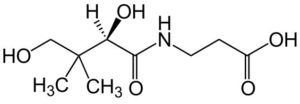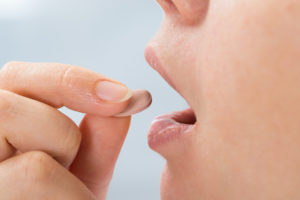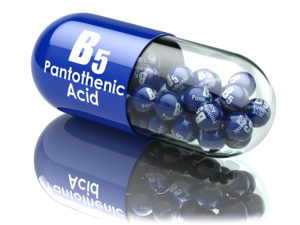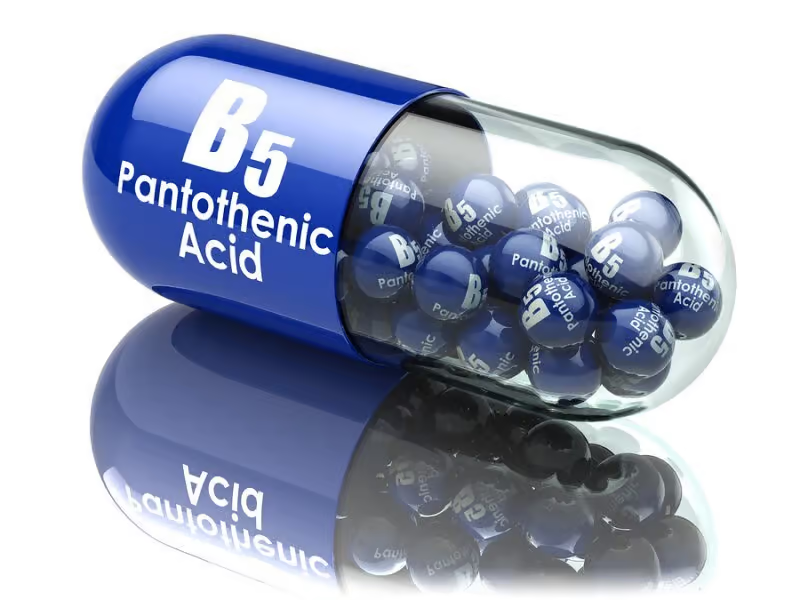Table of Contents
Vitamin B5 (Pantothenic Acid) is one of 8 B-vitamins. B5 is water-soluble and found in every single cell in your body.
Vitamin B5 is essential for the synthesis of acetylcholine (ACh). Adequate levels of ACh can boost focus, memory, learning, and reduce brain fog.
Vitamin B5 is critical for converting nutrients from food into energy, balancing blood sugar, reducing LDL-(bad) cholesterol, lowering blood pressure, preventing nerve damage and pain, and preventing heart failure.
Vitamin B5 plays a part in the synthesis and metabolism of proteins, carbohydrates and fats. Turning them into energy that your brain uses to fire neurotransmitters in your brain.
Vitamin B5 is required for the manufacture of red blood cells, and the stress hormones and sex hormones produced in your adrenal glands.
As a nootropic, Vitamin B5 is crucial for converting the choline in your nootropic stack into acetylcholine (ACh). Without adequate levels of B5 you will not experience the benefits of using precursors to ACh like Alpha GPC and CDP-Choline.
Vitamin B5 (Pantothenic Acid) helps:
- Brain Optimization: Pantothenic acid is at the heart of the KREBs cycle and electron transport chain which helps convert nutrients from food into energy which is used to make adenosine triphosphate (ATP). ATP is the fuel source within each of your cells. More energy increases mental clarity, alertness, memory and mood.
- Neurotransmitters: Pantothenic acid as part of Coenzyme-A (CoA) is involved in the synthesis of the neurotransmitters acetylcholine, epinephrine, and serotonin. Affecting alertness, cognition, memory and mood.
- Mood: Pantothenic acid is often referred to as the “anti-stress vitamin”. Your adrenal glands use CoA (made partly from pantothenic acid) along with cholesterol and Vitamin C to manufacture cortisol and epinephrine. Vitamin B5 has a reputation for reducing stress, anxiety and depression.
What is Vitamin B5 (Pantothenic Acid)?
Vitamin B5 (Pantothenic Acid) is one of 8 water-soluble B-vitamins that are absolutely vital to the highly optimized brain. And is essential to all forms of life.

Vitamin B5 is found in every cell in your body including your brain. The name Pantothenic is derived from the Greek word pantothen, meaning “from everywhere”. Reflecting the idea that small amounts of pantothenic acid can be found in nearly every food.
Foods rich in pantothenic acid include animal organs (liver and kidney), fish, shellfish, milk products, eggs, avocados, legumes, mushrooms, and sweet potatoes. Avocados contain the highest amount of pantothenic acid among commonly consumed foods, with one avocado containing about 2 mg.
Pantothenic Acid is a precursor in the biosynthesis of Coenzyme-A (CoA). CoA is an essential enzyme in a variety of chemical reactions that sustain life.
CoA as Acetyl-CoA is required for generating energy from fat, carbohydrates and proteins. This energy in the form of glucose is the fuel source for each cell.
Acetyl-CoA is also involved in the citric acid cycle (KREBs), in the synthesis of essential fats, cholesterol, steroid hormones, vitamins A and D, and the neurotransmitters acetylcholine (ACh) and serotonin.
Coenzyme A derivatives are also required for the synthesis of melatonin which controls your circadian rhythm and sleep/awake cycle. And for the metabolism of drugs and toxins in your liver.
How does Vitamin B5 (Pantothenic Acid) work in the Brain?
Vitamin B5 (Pantothenic Acid) boosts brain health and function in several ways. But two in particular stand out.
- Vitamin B5 increases energy. Pantothenic acid is an essential coenzyme involved in mitochondrial aerobic respiration. Vitamin B5’s role in the citric acid cycle (KREBs) and electron transport chain helps convert nutrients from food into energy which is used to make adenosine triphosphate (ATP). ATP is the fuel source within each of your cells.
Pantothenic acid takes part in the synthesis of Acetyl-CoA which is at the heart of the KREBs cycle. Acetyl-CoA in your brain is also involved in the synthesis of cholesterol, amino acids, phospholipids, and fatty acids.
CoA is also involved in the synthesis of the neurotransmitters acetylcholine and serotonin, and steroid hormones. User reviews of those supplementing with pantothenic acid claim to having more energy. This boost in energy comes from this long series of events stemming from supplementing with pantothenic acid.[i]
- Vitamin B5 helps reduces stress. Pantothenic acid is often referred to as the “anti-stress vitamin”. Your adrenal glands use CoA (made partly from pantothenic acid) along with cholesterol and Vitamin C to manufacture cortisol and epinephrine.
When cortisol levels are low, your stress related hormones are compromised as is your ability to cope and respond to stress. And if your cortisol levels are abnormally high (a common problem), your body’s reserve of Pantethine (the active form of pantothenic acid) needs to be replenished in order to sustain good adrenal function.[ii]
Vitamin B5 has a reputation for reducing stress, anxiety and depression.
How things go bad when Vitamin B5 is low
Chronic stress, anxiety and lower acetylcholine levels can damage your brain. This damage can manifest in several ways including memory loss, brain fog, anxiety, depression, and even neurodegenerative diseases like Alzheimer’s and Parkinson’s.
↓ Acetylcholine synthesis declines
↓ Concentration, memory, learning, and recall decline
↑ LDL-cholesterol (bad) and triglycerides increase
↓ HDL-cholesterol (good) levels decline
↓ Wound healing takes longer
↓ Energy levels decline
↑ Numbness, tingling, burning sensations, shooting pain in the feet increase
Vitamin B5 supplementation can help increase acetylcholine, epinephrine and serotonin levels in your brain. And help modulate cortisol levels produced in your adrenal glands. Helping you to cope with stress and lessen depression, and less adrenal fatigue.
Vitamin B5 (Pantothenic Acid) Benefits
When you take Vitamin B5 as a supplement, it is converted to Pantethine. Pantethine is a more stable disulfide (double bonded) form of pantothenic acid.
It is this active form of pantothenic acid that is converted into the enzyme Coenzyme-A (CoA). CoA plays a critical role in the metabolism and breakdown of the three essential micronutrients: proteins, carbohydrates and fats.
CoA is a cofactor in more than 70 enzymatic pathways including:
- Amino acid catabolism
- Acetylcholine synthesis
- Carbohydrate metabolism
- Fatty acid oxidation
- Heme synthesis
- Pyruvate degradation
- Phase II detox acetylation
CoA is also involved in the initial steps of cholesterol synthesis and all the downstream metabolites of cholesterol including steroids, Vitamin D, and bile acids.
CoA helps break down the carbon skeleton of amino acids which are metabolized to pyruvate and enter the KREBs cycle. This cycle is crucial to ATP synthesis within your mitochondria.
CoA directs acetyl groups to form ubiquinone (CoQ10), squalene and cholesterol. You also need CoA for the transport of long chain fatty acids into mitochondria where fats are converted into energy.
The bottom-line is CoA is behind the production of hemoglobin, bile, sex and adrenal hormones (steroids), cholesterol and the neurotransmitters acetylcholine and serotonin in your brain.
How does Vitamin B5 (Pantothenic Acid) feel?
Vitamin B5 is water-soluble, and has been shown to improve mood, energy and cognition.
Neurohackers who supplement with pantothenic acid report being wonderfully optimistic, energetic and mentally sharp.
People report Vitamin B5 helps them focus better, they feel a profound increase in energy and concentration improves.
Many people dealing with acne find they have healthier looking skin. Acne is cleared within a few days to a few weeks of supplementing with pantothenic acid.
Men and women find that supplementing with Vitamin B5 helps prevent hair loss. And if taken early enough may even help avoid hair turning prematurely gray.
Some neurohackers report that pantothenic acid helps improve vision and hearing.
Vitamin B5 Clinical Research
Vitamin B5 (Pantothenic Acid) reduces Acne
100 people of Chinese descent (45 males and 55 females) aged 10 – 30 years with severe acne were treated with high-dose pantothenic acid. A total of 10 grams per day were given in 4 divided doses.
Participants were also asked to apply a cream to affected areas 4 – 6 times per day. The cream contained 20% pantothenic acid.
Their face became noticeably less oily within 3 days of starting therapy. Within 2 weeks, facial pore size became smaller and acne lesions began to heal. And the rate of new acne eruptions had slowed.
By 8 weeks, acne was usually controlled. Most acne lesions were gone and new eruptions occurred only occasionally. The participants with severe acne required 6 months of treatment to control acne.
The author of the study noted that in some of the severe cases, daily doses of 15 – 20 grams of pantothenic acid would produce a faster response. 35 patients were monitored for 18 months; the maintenance dose needed to control acne ranged from 1 – 5 grams per day of pantothenic acid.[iii]
Vitamin B5 (Pantethine) to decrease LDL-Cholesterol
User reviews consistently show success with lowering LDL-cholesterol and triglycerides, and raising HDL-cholesterol by supplementing with Vitamin B5 (Pantethine).
The National University of Health Sciences in Illinois conducted an evaluation of clinical trials from 1966 to 2002 for studies using the Pantethine version of Vitamin B5 to improve cholesterol.
28 clinical trials with a pooled population of 646 ‘hyperlipidemic’ subjects were evaluated. Mean age of participants were 52.8 years. Average study length was 12.7 weeks with an average dosage of 900 mg per day of Pantethine.
The mean decrease of LDL-cholesterol (bad cholesterol) was 10 – 20%. The mean decrease of triglycerides was 14 – 33%. And the mean increase of HDL-cholesterol (good cholesterol) was 4 – 11%.
The researchers concluded that “pantothenic acid was an effective therapeutic option in treating patient populations with total serum cholesterol levels greater than 200 mg/dL, and/or serum triacylglycerol levels greater than 150 mg/dL.”
The team noted that the full benefit of Pantethine may not be attained until at least 4 months from beginning supplementation. And that Pantethine is a well-tolerated therapeutic agent that deserves much more attention than it has recently received.[iv]
Vitamin B5 (Pantothenic Acid) increases Longevity
Vitamin B5 is believed to extend life span. But research in humans for obvious reasons has been difficult. Humans live longer than most mammals. And tracking human subjects for life would be prohibitively expensive.
So animal research is the next best thing. A team in Austin gave 33 young male and female mice 300 μg of calcium pantothenate daily in drinking water. Forty-one control mice did not receive the vitamin supplement.
The mean life span for mice who received calcium pantothenate was 653.1 days. And for the control mice life span was 549.8 days. The mice using Vitamin B5 lived 19% longer.[v]
Royal jelly has long been used as a longevity supplement. And some of the science backs this up. Pantothenic acid is the primary anti-aging factor isolated from royal jelly.
The combination of pyridoxine, biotin and sodium yeast nucleate extended the lifespan of the common fruit fly. And the addition of pantothenic acid further increased life span.[vi]
Seems that supplementing with pantothenic acid (Vitamin B5) will help you live longer.
Vitamin B5 Recommended Dosage
If you are using an acetylcholine (ACh) precursor like Alpha GPC or CDP-Choline in your nootropic stack, you should be using Vitamin B5. Because B5 is needed to make Coenzyme-A (CoA). CoA and choline are needed to synthesize acetylcholine.
The recommended dosage of Vitamin B5 (Pantothenic Acid) is a one-to-two ratio with a choline supplement. For example, 250 mg of Vitamin B5 with 500 mg of CDP-Choline.
If you don’t get enough Vitamin B5, you may not notice significant improvements when supplementing with your preferred choline source. If you’ve added choline to your racetam stack and still get a “choline headache” it’s likely because you don’t have adequate Vitamin B5 in your system.
Pantothenic Acid or Pantethine is generally well tolerated in doses up to 1,200 mg/day. Some neurohackers report doses above 1,000 mg can induce gastrointestinal side effects like nausea or heartburn.
Oral contraceptives (birth control pills) containing estrogen and progestin may increase the requirement for additional pantothenic acid.
Use of Pantothenic Acid in combination with cholesterol-lowering drugs (statins) or with Vitamin B3 (niacin or nicotinic acid) may produce additive effects on blood lipids. So be careful because you could lower LDL-cholesterol to unhealthy levels.
Vitamin B5 Side Effects
Vitamin B5 (Pantothenic Acid) is non-toxic. So is considered well-tolerated and safe.
Side effects are rare but very high doses can include stomach upset, nausea or diarrhea.
If you are taking the antibiotic tetracycline, you should avoid using extra Vitamin B5 because it could negate the effects of tetracycline.
If you are on drugs called cholinesterase inhibitors used for treating Alzheimer’s, you should not be using Vitamin B5.
Type of Vitamin B5 to buy
When choosing a Vitamin B5 supplement, your basic choice is between Pantethine or Pantothenic Acid.
Pantethine is by far the more active choice when it comes to producing CoA. And this is backed up by many clinical trials. Researchers have pointed out that Pantethine creates twice as much CoA compared to Pantothenic Acid.
However, Pantothenic acid does have its benefits. It enhances adrenal function and modulates inflammation. If you can, find a supplement that combines both.
Vitamin B5 supplement labels will show pantothenic acid as “Calcium” or “sodium D-pantothenate” which is used for treating stress, migraines and allergies.
Pantethine is mainly recommended for lowering blood cholesterol levels. And Pantethine is better for stacking with a choline supplement because it creates more CoA than other pantothenic acid derivatives.
Pantothenol (panthenol) is a stable alcohol analog of Vitamin B5 (pantothenic acid), which can be rapidly converted to pantothenic acid by humans.
Most multivitamins also include some form of Vitamin B5 (Pantothenic Acid) in their formula. But many of these multis don’t contain enough for optimum health. And many have an inferior isolated or synthetic version of the nutrient.
The Performance Lab® NutriGenesis Multi offers a nature-identical form of Vitamin B5 (Pantothenic Acid) and is now my favorite daily multivitamin/mineral supplement.
I prefer the Performance Lab® multi because it’s more potent, it’s biologically active and I’ve found to be a far more effective multi compared to every other multivitamin supplement I’ve ever used.
Performance Lab® uses their own priority NutriGenesis® vitamins and minerals which are grown on probiotic, plant and yeast cultures in a state-of-the-art lab.
Nootropics Expert Recommendation
Vitamin B5 (Pantothenic Acid) up to 1,000 mg per day
 I recommend using Vitamin B5 as a nootropic supplement.
I recommend using Vitamin B5 as a nootropic supplement.
Your body does not make Vitamin B5 on its own. So to get its benefits you must get it from food, or take it as a supplement.
Vitamin B5 is especially helpful for those suffering from low energy levels, anxiety, depression, and chronic pain.
Experience shows Vitamin B5 helps stop and reverse the symptoms associated with high cholesterol levels. B5 will lower ‘bad’ LDL-cholesterol and triglycerides as well as raise ‘good” HDL-cholesterol.
Vitamin B5 is also particularly helpful to students and executives who want to boost cognition, learning and memory. Because it raises acetylcholine levels in your brain.
Vitamin B5 can produce a noticeable increase in mental clarity. And give you a significant energy boost physically and mentally. You’ll feel more awake and alert. Without the side effects you’d get from stimulants like caffeine.
Vitamin B5 is a must have addition for any nootropic stack. If you are using any of the racetams like Piracetam and Aniracetam and are using a choline supplement to raise acetylcholine levels, you absolutely need extra pantothenic acid.
The recommended dosage of Vitamin B5 (Pantothenic Acid) is a one-to-two ratio with a choline supplement. For example, 250 mg of Vitamin B5 with 500 mg of CDP-Choline.
At the very minimum every neurohacker should be using a multivitamin every day that includes Vitamin B5 (Pantothenic Acid). The best multi I’ve found and use every day is the Performance Lab® NutriGenesis Multi for men or women.









Join The Discussion - 70 comments
Albert
May 25, 2020
Could vitamin B5 help with a scalp fungus?What vitamins or minerals would you recomend for a scalp fungus?And what dosages?
David Tomen
May 26, 2020
Albert, vitamin B2 (riboflavin), B3 (pantothenic acid), and B9 (folate) pathways appear to offer anti-fungal activity: https://www.ncbi.nlm.nih.gov/pmc/articles/PMC6023522/.
You can also use coconut oil: https://nootropicsexpert.com/coconut-mct-oil/ and Black Seed Oil: https://nootropicsexpert.com/black-seed-oil/
Ralph Jimals
May 12, 2020
is non-fortified nutritional yeast a good way to get B vitamins, especially B5? What about yeast for B6?
I’m trying to get lots of zinc from plant based foods, and yeast is zinc rich.
it’s a complete protein – high in lysine – it’s a complimentary protein to nuts and seeds
– low sugar, high in special fiber (beta glucan)
David Tomen
May 13, 2020
Ralph, the problem with depending on foods like nutritional yeast is you do not know how much of each vitamin you are getting. Unless you can get the company to send you a Certificate of Analysis which shows testing done on the batch you are currently using. But I highly doubt that’ll happen.
It seems to me that for around $10/month you can get a B-Complex supplement grown in a yeast medium where you know exactly how much of each B-Vitamin you are getting per dose. Like this one:https://amzn.to/2T1UjUq
Carina
April 9, 2020
When is the best time to take panthetine?? will it lower cortisol during the day?? I would like to lower cortisol at night and not during the day. Thank you for any insight that you might have.
David Tomen
April 23, 2020
Carina, B5 will help keep cortisol in check day and night as long as you have adequate levels in your system. Your body and brain can only use 10 – 20 mg per day and excess is eliminated in your urine.
You can split your dose morning and evening if you are concerned about keeping adequate levels in your system.
Rae
September 22, 2022
Your body can only use 10 – 25mg of cortisol or b5?
David Tomen
September 24, 2022
Rae, your body can only use up to 25 mg of Vitamin B5 per day.
Cortisol is a stress hormone produced by your adrenals. In excess cortisol will cause problems including anxiety and insomnia.
I just looked at Carina’s comment again and should have mentioned you can use 200 – 400 mg L-Theanine before bed to reduce cortisol during the night. But avoid using it during the day if you are not interested in reducing cortisol.
John Goj
November 30, 2019
Dear Mr David Toman.
I am male 83 years old and had been diagnosed 5 years ago with cervical spinal stenosis and my surgeon recommended surgery. I declined because I am still doing out in the gym 4-5 days a week. I make sure I eat a LCHF and protein diet daily. I also take whey protein and Vitamin B-Complex B1, B2, B6 & B12) daily. I came across you video on Vitamin B5 (Pantothenic Acid) last week, and I bought a bottle 100 capsules 500mg each daily. My question is: is 500mg daily insufficient, your recommendation is 1000mg? Question #2: can I take B5 with the rest of my B-Complex at the same time with meal? Thank you.
David Tomen
December 1, 2019
John, Pantothenic Acid (B5) is generally well tolerated in doses up to 1,200 mg/day. Some people report doses above 1,000 mg can cause side effects like nausea or heartburn.
Please see the section above called “Available Forms” and get an understanding on the difference between Pantethine and Pantothenic Acid. If you get some of each version of B5 then 500 mg per day should be enough. So check the label on your B5 supplement and your B-Complex supplement to see which version of B5 is on each.
The B-Complex vitamins are water soluble so you can take them on their own or with a meal.
John Goh
December 3, 2019
Mr. David, Thank you for your prompt reply. Since B5 is also B-Complex vitamin family, do you think it is okay taking together with or without a meal. My question #2 refers.
David Tomen
December 3, 2019
John, the B-Vitamins are water soluble so it doesn’t matter if you take it with a meal. They do not need fat to help carry them past cell walls. So with or without is OK.
Xa
May 6, 2019
4 days on panthetine, it look like it reduce “floaters” in the eyes
(big time. 15% a day)
it’s funny, I was expecting DMAE to reduce it, but it didn’t
Cemal
March 2, 2020
Hey man, which one do you use? What brand and name so i can buy it.
John
May 4, 2019
I was watching the b5 video you made on youtube and I have a question you may be able to answer. Im taking the ayuverdic herb ashwagandha. Its known to have acetylcholinesterase inhibitory effects. In the video you mentioned that if you were on a cholinesterase inhibitor for dementia not to take a b5 supplement. Is that also true in the case of Ashwagandha? Thanks
David Tomen
May 4, 2019
John, it’s possible because the danger is increasing acetylcholine too much. With either supplement it depends on how much you use.
Vitamin B5 is required for the healthy brain including if you are dealing with Alzheimer’s. There may be problems when combining these supplements with drugs like the ones used to treat Alzheimer’s.
Wim
May 1, 2019
Thanks David,
I wish I have read this earlier.
I have some questions :
“Use of Pantothenic Acid in combination with Vitamin B3 may produce additive effects on blood lipids. “
Most B complex they sell have both. Should they be bought separately then to take on different time intervals ?
“Your adrenal glands use CoA (made partly from pantothenic acid) along with cholesterol and Vitamin C to manufacture cortisol”
So B3 increases the cortisol.
I was taking Ashwagandha to lower cortisol. And it help a lot with stress.
What happens if you take both?
I presume I have high cortisol (doctors won’t discribe the test) because Ashwagandha I feel very strong the difference in a positive way .
David Tomen
May 1, 2019
Wim, our bodies need cortisol. Because it helps control blood sugar levels, regulates metabolism, helps reduce inflammation, and assist with memory formulation. It has a controlling effect on salt and water balance and helps control blood pressure. It’s when you have excess cortisol usually caused by a tumor on pituitary or adrenal glands that you can have problems.
And please refer to the entire paragraph to keep things in perspective, “Use of Pantothenic Acid in combination with cholesterol-lowering drugs (statins) or with Vitamin B3 (niacin or nicotinic acid) may produce additive effects on blood lipids. So be careful because you could lower LDL-cholesterol to unhealthy levels.”
Wim
May 2, 2019
Thanks David for the profound info,
so Pantothenic Acid with Ashwagandha is a good combination to level cortisol? not to high and not to low?
LDL:
(i am making an excel for each action of the supplements I take to see if they balance each other out or sum up to much on one side. Once finished I sent it you. Will take time. I am only with blood & hart now.
decrease: B3, B6, Astaxanthin (small%), Vinpocetine (small), Curcumin almost nothing, Milk Thistle (%?)
Berberine (25% if LDL is high)
increase: D3 (+5%), DHA (%?)
it seems I have some room for an other supplement that does a lot of other good things but increases also LDL
learning to cycle them will be a future step once I understand them all better.
Wim
May 2, 2019
typo error: not B6, please change to B5 instead for the decrease of LDL
David Tomen
May 2, 2019
Wim, should be a good combo for controlling cortisol.
Susan murphy
December 15, 2016
This was very informative. Symptoms and testing show that I do not make or release adequate epinephrine. My levels of dopamine and norepinephrine are fine. AND my cortisol runs high. This is the only place I have seen it mentioned that pantethenic acid increases epinephrine. Other sites mention pnmt and Sam-e as necessary to convert norepinephrine to epinephrine. Please tell me your thoughts on my low epinephrine and what to do about it.
Thanks!
David Tomen
December 16, 2016
Susan, have you been tested for Cushing’s Syndrome? If you can eliminate that one, I’d next get checked for either a pituitary or adrenal adenoma. Excess cortisol can be caused by a lot of things. Including too much ACTH being released from your pituitary gland. I’m certainly not a doctor and cannot provide you with medical advice. But I’m hypothyroid and dealt with adrenal fatigue for years. And found the only way to figure these things out is by the process of elimination.
You may also want to see if you have an issue with the PNMT enzyme that converts norepinephrine to epinephrine. I believe that can be tested as well.
Epinephrine is produced in the adrenal medulla (interior) and cortisol produced by the adrenal cortex (outside). Too much cortisol can suppress epinephrine production. So while working with a doctor you trust, I’d try using https://nootropicsexpert.com/ashwagandha/ or https://nootropicsexpert.com/rhodiola-rosea/ to see if you can get your cortisol under control.
I’d also make sure I’m taking a good B-vitamin complex which includes folate (not folic acid) and methylcobalamin (not cobalamin) because many B-vitamins are involved in neurotransmitter production. And try SAM-e as well which is part of the the epinephrine production process as you know.
I’d appreciate an update as you go through this because I know it’ll help a lot of other people dealing with these issues.